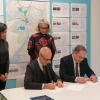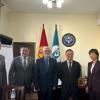News
Displaying Results 151 - 168 of 168
A UNECE working paper released today, Population and migration statistics in Armenia: current situation, future plans and ways to improve describes how Armenia is improving its statistics on population and migration by combining administrative data with sample surveys. The study reviews innovations…
Joint efforts to harmonize data collection, strengthen monitoring and data exchange on water quality, develop early warning systems on water pollution at transboundary waters and improve collection and sharing of data on transboundary aquifers are needed for effective regional cooperation in…
While Uzbekistan has improved its environmental performance in line with the Sustainable Development Goals (SDGs) related to water and sanitation (SDG 6) and forests and tree cover loss (SDG targets 15.1, 15.2, 15.3), significant challenges remain related to air quality (SDG 11.6), water resources…
Decarbonizing industry remains a key challenge for climate action: according to the International Energy Agency, industrial activity was directly responsible for emitting 9.4 Gt of CO2 in 2021, accounting for a quarter of global emissions (not including indirect emissions from electricity used for…
UNECE is mobilising international architects to help the city of Mykolaiv, Ukraine’s ninth largest city, to develop a forward-looking, people-centred master plan for its reconstruction.
Since July 2022, UNECE has engaged One Works, an international design company in Milano, Italy, to provide…
At its seventy-seventh meeting (Geneva, 13–16 December 2022), the Compliance Committee of the UNECE Convention on Access to Information, Public Participation in Decision-Making and Access to Justice in Environmental Matters (Aarhus Convention) invited fourteen Parties to attend open sessions to…
It is critical that construction industry’s general contractors, architects and governments find ways to innovate and incorporate minimum efficient standards and innovations, such as architectural upcycling and recycling, through proper and updated legislative frameworks and rules as well as…
In the past years, Central Asia has been facing major climate-change related challenges – drought, floods, desertification, sandstorms, extreme cold and heat spells – and many more. Not only have these affected rural areas, but cities have been suffering, too. Accentuated by increased traffic…
Despite a marked overall improvement over the last ten years of the economic picture in Bishkek, Kyrgyzstan, urban planning lagged, and the development of basic and social infrastructure did not keep up with population increase, particularly in informal settlements. According to estimates shared…
With climate and biodiversity loss heading the news these days, another problem related to the planet we all share is often forgotten: air pollution. Air pollution has an enormous burden on public health, ecosystems, climate, and ultimately, the economy. Globally, the World Health Organization (…
A dilemma has galvanised the Public-Private Partnerships (PPPs) and infrastructure community for some time: How to ensure the bankability of pipelines of sustainable projects in emerging economies. PPP lenders and debt-providers continue to argue that there are not enough bankable projects to…
The UNECE Protocol on Pollutant Release and Transfer Registers (PRTRs) continues to support actions to promote transparency in environmental matters across the globe. It drives the development of national legislation and practice towards a common set of international standards, bringing about…
During her recent two-day visit to Turkmenistan UNECE Executive Secretary Olga Algayerova spoke at international conference “Dialogue is a Guarantee of Peace” in Ashgabat and discussed areas of cooperation with the highest government officials, focusing on future circular, digital and green…
Risk is a part of our everyday lives. When we wear a helmet to ride a bike, for example, we accept a small inconvenience to reduce the risk of a fall or an accident. When a homeowner decides to retrofit their house, they incur a cost to shield against an earthquake or a flood. Faced with the COVID…
The UNECE region, in particular Europe and North America, has become the epicenter of the COVID-19 pandemic. In addition to the devastating impact on lives and health, countries in the region are suffering heavy socio-economic consequences. The Gross Domestic Product (GDP) is projected to fall…
On 8 March, we celebrate International Women’s Day with this year’s theme “I am Generation Equality: Realizing Women’s Rights”. We still have a long way to go. In October 2019, UNECE hosted a regional meeting to review the progress and discuss the challenges in the implementation of the most…
Every year we lose about 14% of the food produced before it is sold, and this does not even include the food never harvested. Even more is wasted at retail and consumer levels. At the same time, over 800 million people worldwide suffer from hunger, while food loss is a major contributor to CO2…
The world is urbanizing fast. Already today, half the population is living in cities. By 2050, that proportion is projected to rise to over two thirds. Cities are economic powerhouses, accounting for 80 percent of world GDP. They also have large ecological footprints, accounting for 60-80 percent…














